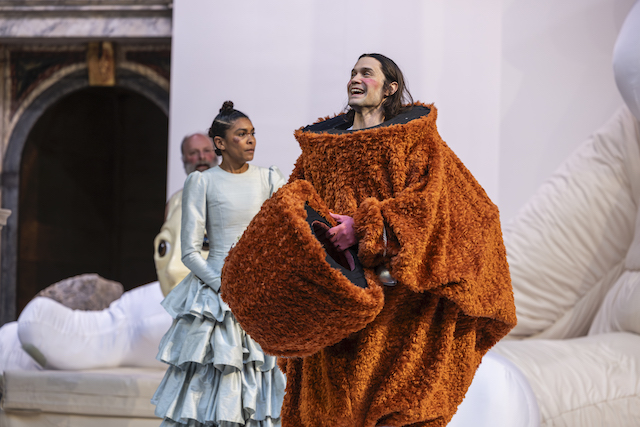A recent Crime Survey for England and Wales estimated that 2.1 million people in the UK had been victims of domestic abuse in the year ending March 2023. So it makes sense that director Jude Christian has addressed this tricky, troubling Shakespeare play by amplifying the genuine trauma caused by Petruchio’s “taming” of his wife Katharina.
What makes less sense is her simultaneous playing up of the script’s pantomime aspects, so that the stage is filled with everything from a giant teddy bear to a costume that makes Petruchio look like the Cookie Monster (pictured below). Often The Taming of the Shrew leaves a bad taste in the mouth, but this interpretation feels more like conceptual indigestion.
It’s a shame, because there are many fine individual elements to the production – not least the opening sequence in which Nigel Barrett’s raucously charismatic Christopher Sly staggers drunkenly through the audience, bellowing and picking arguments. When a female groundling takes offence and storms on the stage to throw beer in his face, the atmosphere goes from frozen shock to the realisation that this is the audience’s introduction to Thalissa Teixeira’s spikily assertive Katharina.
This moment of genuine dramatic tension is succeeded by a more whimsical, almost surreal set up as Christopher Sly is confined to an open-topped cage at the side of the stage and the play within a play begins. Each member of the case is given a strip of paper and, as if they’re in a party game, reads out the description of the character they’re about to play with alternate degrees of elation or disappointment.
This too is a device that works well, but immediately afterwards the tone becomes much more confused. Maybe it’s perverse to complain about too much invention in a production – especially in a venue that embraces the carnivalesque like the Globe – but the conceptual clashes discombobulate more than they provoke.
Take Rosie Elnile’s set, which is dominated by a gargantuan white teddy-bear figure with love heart eyes that looks like a steroid-pumped version of the kind of toy you might buy in a greetings card shop. It’s so vast that characters can erupt onto the stage through its belly or recline on its legs as if they were sofas.
The puppetry – presided over by Emma Brunton – is a key part of the aesthetic, playing on Katharina’s withering assertion to Petruchio that “Belike you mean to make a puppet out of me”. Most successful of the puppets is the doll operated by Katharina’s sister Bianca (a spirited Sophie Mercell), in which she parodies the flirtatious games she must play. Petruchio operating a puppet version of himself when he’s “wooing” Katharina nicely heightens the unease of their exchanges. But the slip back into cute grotesquery, when he appears at his own wedding looking like the Cookie Monster (a resemblance that may not be entirely deliberate) is mystifying.
That’s not least because the production leaves us in no doubt that his brutality is unfeigned. A chill runs through the auditorium when Eloise Secker’s empathetic Grumio ditches her jauntiness and confides in a voice threadbare with fear how much she has suffered under her master. Andrew Leung brings vitality and colour to the role of Petruchio. Yet there is no moment when we can feel any empathy for him whatsoever and as a result the more riotous the comedy becomes, the more hollow the whole endeavour feels.
Teixeira’s Katharina is by contrast both dignified and appealing – we watch in horror as the spiky defence she has created to protect herself against the world’s idiocies is gradually stripped away, not least when she appears literally dressed as a shrew at the end. Yet even the music – in which the singers are too often drowned out by the musicians – can do little to lift a production which ultimately slips down like the bitterest of pills.














Add comment